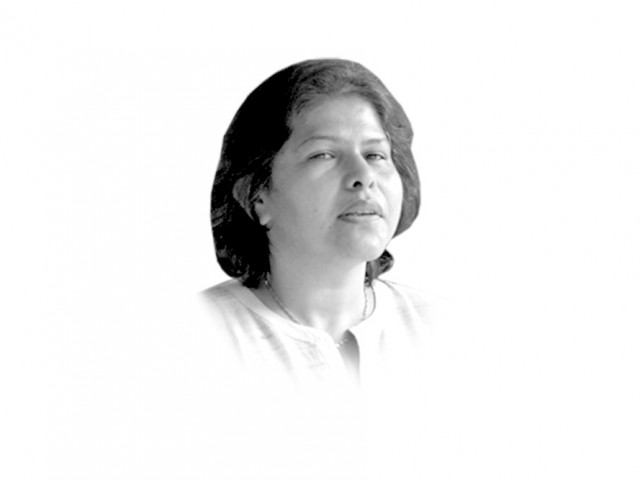Countering terrorism
NACTA would probably benefit from making a short-term versus a long-term strategy to deal with the problem.

The writer is an independent social scientist and author of Military Inc.
However, both the government and the media seem to be heading for a quick-fix formula or, at least, putting something on paper that will indicate their resolve to solve the problem (maybe without actually doing so). The National Counter-Terrorism Authority (NACTA) created under an act of parliament seems to have come up with a draft policy, the executive summary of which was leaked to the press. It seems to be divided in three portions: a) assessment of problem, b) highlighting institutions and capacity building for counterterrorism and c) introducing the narrative of peace and de-radicalisation. Since the subject is vast, I would deal with it in three separate articles beginning with this one, which will deal with the tactical aspects of the problem and related policy.
It is quite clear that people in the country and the outside world are eyeing NACTA expectantly. It is supposedly structured as an institution that will be the epicentre of counter-terrorism in all aspects. This makes it imperative for the NACTA team to engage with all perspectives, which it doesn’t seem to be doing. It claims to have gone around the country, collected secondary and primary information and spoken to people. However, its assessment does not seem to reflect a wide-ranging interaction that would bring varied perspectives together for the benefit of understanding the problem and finding relevant solutions. Thus, the assessment of the problem is limited to what is fashionably heard in government circles. It will help if the NACTA team did a few rounds of discussions with various stakeholders from the government, civil society and experts on the issue. These discussions could be summarised and presented as a background document.
At a tactical level, the paper seems to point correctly towards capacity building like strengthening police and judiciary, improving integration of intelligence and working on reintegration of former combatants who have left the business of jihad, into society. There are two aspects of capacity building. First, the government will have to commit resources for capacity building. It is not a secret that through the years of fighting the war on terror, Pakistan has invested very little in its law-enforcement organisations. The police require training and better equipment. There is an urgent need for information sharing amongst various intelligence agencies and need to procure new technologies for forensic testing and other capabilities. All of this will require resource commitment, which is a major political decision for parliament to take.
Second, capacity building must include a clear definition of roles and authority. One lesson learnt from the leaked Abbottabad Commission report is that the military unduly exercising authority where the police should, creates problems. There should be empowerment and de-politicisation of the police to make things work.
Third, no amount of training or weapons and facilities can bolster the morale of law-enforcement agencies, especially if it has nosedived the way it has in Pakistan. The fact of the matter is that what the police need is assurance that the governments will fight terrorism and not make compromises. Through the years, the police have lost hundreds of good men because successive governments didn’t have the will to fight. Be it Karachi or Jhang, men got sacrificed at the altar of pragmatism. Men remember how, for example, Malik Ishaq got numerous witnesses, including a senior police officer killed because no one was willing to move against him and the police had no real protection. Allegedly, the officer, who killed one LeJ terrorist leader, Riaz Basra, cut a deal with the government and settled abroad after he had done the job. Interestingly, in Basra’s case, the higher officials used the sectarian card to finally get their man.
We also know that there is sufficient infiltration of jihadi networks in the police department and security establishment. There are senior police officers in Punjab (serving and retired) who go around fixing appointments for Hafiz Saeed and other militant leaders. The question is, how will NACTA deal with this? It is important to build professionalism as a capacity where law enforcers are ready to protect the state and its citizens irrespective of their cast, sect, gender or ethnicity.
A clean and professional police force is as critical for counter-terrorism as a professional judiciary. I have spoken with judges from lower courts who were extremely bigoted in their thinking. But then there is the fear factor due to which judges will not touch militants. Thus, the anti-terror court judge who convicted Malik Ishaq fled the country like the one who sentenced Salmaan Taseer’s murderer to death. This is not just about providing protection to a judge as long as he/she is there but to their family as well, and even after they are not hearing a particular case. All of this will cost money.
At a time when all state institutions are experiencing a meltdown due to their acute politicisation and weakening of the state, building capacity is not just about acquiring modern tools. A law enforcement set-up that takes sides and is ideologically motivated is extremely dangerous. NACTA would probably benefit from making a short-term versus a long-term strategy to deal with the problem. As it builds the will, professionalises and ideologically neutralises law enforcement and the judiciary, there should also be a plan of who will deal with militancy in the short term.
Published in The Express Tribune, August 1st, 2013.
Like Opinion & Editorial on Facebook, follow @ETOpEd on Twitter to receive all updates on all our daily pieces.













COMMENTS
Comments are moderated and generally will be posted if they are on-topic and not abusive.
For more information, please see our Comments FAQ